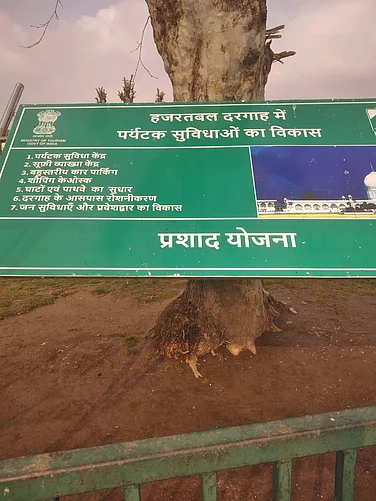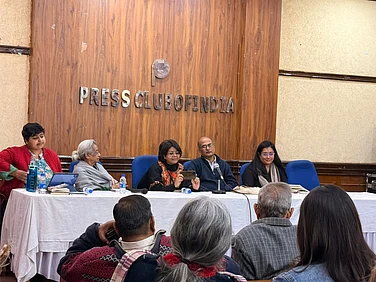YOU can't lay the blame for the lacklustre campaigning for Lok Sabha polls in Jammu and Udhampur and the virtual absence of it in the Kashmir Valley on T.N. Seshan and the Election Commission. It is actually the element of fear that things could go wrong at any moment; and the further you go from Jammu, the more intense the paranoia gets. But for Ladakh, where free and fair polls can be guaranteed, the militant factor has once again cast its shadow over the polls. It is not only the pro-Pakistan groups like the Hizbul Mujahideen and mercenaries from Afghanistan who threaten the poll process, but also surrendered militant organisations like the Ikhwan-ul-Muslimoon who operate with the tacit support of the BSF and the counterinsurgency force, the Rashtriya Rifles.
In fact, with the National Conference, the only political party with a following of any significance in the Valley, opting out of the polls, the Awami League, the hurriedly cobbled together political face of the Ikhwan-ul-Muslimoon is emerging as the Congress' main rival. The League has fielded candidates in all three constituencies in the Valley—Srinagar, Anantnag and Baramulla—and the Congress campaign is gripped by the fear of being set upon by the gun-wielding boys of the Ikhwan-ul-Muslimoon.
PCC General Secretary Taj Mohi-ud-Din, who is the Congress candidate from Anant-nag and whose campaign office in his constituency was allegedly attacked by Ikhwan militants, has been vocal about 'government sponsored' militants contesting the polls ( see box ). Ghulam Rasool Kar, the PCC chief, has not been so harsh but has called for an end to the use of the illegal gun. Kar, who is contesting from Baramulla, has had his car sprayed with bullets despite security.
Indeed, Kar and other Congressmen are finding it difficult to come to terms with the presence of the Awami League, a party which has no political moorings. There is fear that the League will use gun power to get votes or even indulge in rigging. Says Kar: "I don't know much about this Awami League. It is a party created by some bureaucrats. Now that they are contesting elections, we have to accept them. Should they win, whatever the means they use, we have to sacrifice ourselves for democracy."
The Congress presence is hardly felt in Srinagar or elsewhere in the Valley. Election fever is certainly not in the air. And as Kar poses for photographs with the party's candidate from Srinagar, Ghulam Mohammed Magami, before the dilapidated building that houses the party office, one gets the feeling that the Congress campaign has not quite taken off. Admits Kar: "We are meeting people. We don't believe only in flags and banners."
The Awami League is the only party which moves around in an armed convoy through the main thoroughfare of Srinagar making announcements. Its chief, Javed Ahmed Shah, a former militant who is its candidate from Srinagar, speaks with confidence about the response he has been getting in all three constituencies in the Valley. He also denies that he is in any way using the Ikhwan-ul-Mulsimoon's gun power in his campaign. Says Shah: "We are not using any guns. Neither are we agents of India. We are fighting the elections for the people. We will win." Shah is confident that the people will come out openly and vote.
BUT very few in Srinagar believe him. The All Party Hurriyat Conference (APHC) has already given a call to boycott the elections. And though the Hizbul Mujahideen has been strangely silent, there are fears that it will strike closer to election time. Srinagar goes to the polls on May 30 and there is talk that the militants are awaiting the formation of the new government at the Centre and its decision on holding elections before moving out of their hideouts. Fearing that this could be the lull before a storm, families in Srinagar have already begun stocking rations for a month in anticipation of trouble.
There are also fears of Pakistani agents being sent from across the border to sabotage the elections. The IG of the BSF, Kashmir Sector, Appa Sahib Alur, talks of about 500 ISI agents having already infiltrated into Kashmir. This is in addition to the Afghan mercenaries who are already present in the Valley. According to Alur, the militants' plan of action is to "lob grenades, make sneak attacks, force locals not to vote and plant mines on the routes used by security forces".
Then, there is the apprehension that Ikhwan gunmen will make concerted efforts to ensure that the Awami League wins. This is one reason why many Congressmen fear rigging. Even as the list of candidates was being finalised, senior Congressman Mian Bashir pulled out, fearing "large-scale rigging". Bashir then told the press: "There is every likelihood of the voter not being allowed his right to franchise." Bashir's exit has created a rift with -in the Congress.
There is no doubting that the Ikhwan cadres are active. On one tour of the rural constituencies outside Srinagar we were stopped by a gun-wielding Ikhwan militant. Three armed companions were stopping vehicles and demanding money. When told that we were members of the press from Delhi, the gunman wanted to know if elections would actually be held in Kashmir. He himself was not very sure.
But what has been the overall response to the elections? It is evident that the people have become tired of the gun culture. It is also clear that although a higher percentage of voters than in 1989 may not be averse to casting their ballot, they may not actually do so, particularly in the Valley, because of fear. And while there is some level of enthusiasm in the rural belts in Baramulla district, popular indifference is very perceptible in the towns.
Perhaps one source of encouragement for the Government would be the fact that as many as 110 candidates have come forward to stand for elections. In 1989 this number was 63. In the Valley alone there are 37 candidates, with 11 contestants in Srinagar. But this figure could be misleading since many of the candidates are in the fray to avail of the Z-category security and accommodation in the MLA Hostel in Srinagar that is being provided to every contestant. Even out-of-town candidates are staying in the hostel and for many like B.A. Rathod, a former Congressman standing as an Independent from Anantnag, elections are no more than an opportunity to spend time in Srinagar.
In Baramulla, Ghulam Rasool Kar is pitted against Ghulam Mohammed Mir of the Awami League. And in Anantnag, where the Ikhwan has a strong presence, for Taj Mohi-ud-Din it is a big struggle to even reach his electorate. The League candidate there is Shiban Tickoo.
In addition to the Awami League presence in the Valley, there are also fears with the Congress that the League and the BJP may capitalise on the migrant Hindu votebank. The League as well as the BJP has been campaigning among the displaced Kashmiri Pandits and their votes could be decisive in the Valley, particularly if the voter turnout is low. In all there are over 90,000 migrant votes for the three constituencies in the Valley.
A semblance of electioneering in the more conventional sense is evident in Jammu where the Congress candidate, Mangat Ram Sharma, is pitted against the BJP's Vaid Vishnu Dutt. While Dutt Balwan Singh, the Janata Dal candidate, feels that they are campaigning under the threat of the gun, Sharma is of the view that the atmosphere is 'just right' for elections. In Jammu the candidates move about freely, visiting villages and holding public meetings. Elections in Jammu and Ladakh are due on May 7.
In neigbouring Udhampur constituency, which goes to the polls on May 23, the picture is a little different. As one leaves Udhampur town and approaches Doda district, which is part of the constituency, one perceives a distinct change. This is one of the districts labelled 'militant infested' and no party has dared campaign in the area. In village after village no one knows who the candidates in the fray are. Many have only heard of the elections over the radio.
As Chamanlal Gupta, the BJP candidate, points out: "We have always been maintaining that there can be no elections if terrorism is not brought to an end. Doda is a dangerous zone and we can only campaign if the Government provides us the right kind of security." His congress rival, Janakraj Gupta, admits that he has not started his work in Doda. For all this, Udhampur is likely to see a reasonable level of voting.
But the success of the election process in Jammu and Kashmir hinges on the response in the Valley. The Hurriyat Conference says it will launch an anti-election awareness campaign among the voters. One of its leaders, Shabir Shah, is confident that the people of Kashmir will not be 'fooled'. He also fears that the elections will lead to an escalation in violence.
The focus of the elections has shifted in the Valley, to the Awami League. Should the League win a seat or two, it would further strengthen the Ikhwan-ul-Muslimoon which in the name of fighting militancy has been terrorising the people. Strangely enough, the Congress for the first time in its history will be fighting a group sponsored by the Home Ministry in Delhi.






















